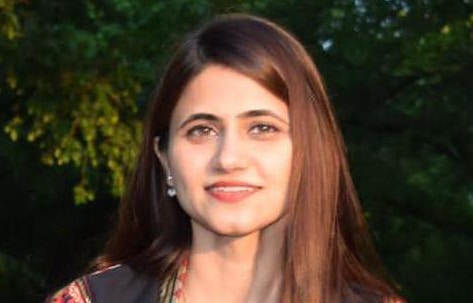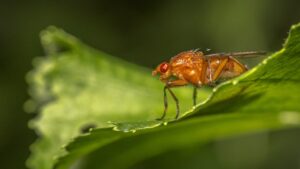Nida Ghori is a Fulbright Ph.D candidate at Kansas State University studying wheat genetics with Dr. Guihua Bai in the USDA Central Small Grain Genotyping Lab. She earned B.S. and M.S. degrees in Plant Breeding and Genetics from University of Agriculture in Faisalabad, Pakistan. Nida’s current research is focused on map-based cloning of the Hessian fly resistance gene H34 and development of precise diagnostic markers that will result in durable resistance and reduce pesticide use. She is using modern genomic tools including GBS, RNA-Seq, and the wheat pan-genome platform to speed up the positional mapping, gene cloning, and its functional validation. Nida was selected to participate in a career development workshop for young scientists at Cornell University and also won the 2020 Don C. Warren Genetics Award at Kansas State University. She was also selected as a National Association of Plant Breeders (NAPB) Borlaug Scholar for 2021.
What is one thing not many people know about you or would be surprised to learn, and does this one thing influence your plant breeding work?
In general people have the perception that I am intelligent and get my things done easily. However, for me along with intelligence, resilience and hard work are the keys to success. These key characteristics are part of my personality and have influenced my breeding work as well. As we all know, science and research demand patience and commitment to accomplish our goal. So, whenever I come across with a new challenge in my research, practicing resilience has helped me in coming out of difficult situation with better outcomes. I always set my goal both in personal and professional life ahead of time which is another important component in my personality. This approach has established in me a sense of accountability to ensure my progress is tracked and celebrated on time.
Tell us about your work and why it matters. What is the Hessian Fly and what do you find so fascinating about it?
Hessian fly (HF) is a tiny insect which causes significant yield losses across the U.S. and throughout the world as well. Though much work has been done on HF resistance and many strategies have been developed to overcome these losses, we still we are lacking in research compared to other diseases and insect pests. So far, many genes have been mapped of different wheat chromosomes, but no diagnostic markers are available for breeders. I was intrigued by the fact we do not have markers and no gene has been cloned against HF so far. I started my project focusing on diagnostic marker development and gene cloning for Hessian fly resistance through high-throughput genotyping and using other advance genomic and molecular breeding tools and technologies. Those markers will help breeders in marker assisted selection and gene pyramiding as well to develop genetically resistant cultivars.
Where did you grow up and did your early life influence your decision to enter plant breeding? If so, how? If not, when did you catch the plant breeding bug? Tell us that story.
I grew up in Faisalabad which is third big city in Punjab, Pakistan. During my high school, my interest was developed in genetics, and I set my objective to do something in human or plant genetics. I took plant breeding as a major subject in my undergraduate studies and did specialization in plant breeding and genetics during my graduate studies. There I learned plant breeding has a pivotal role in crop improvement and has a strong link with food security. I was mainly interested in working on wheat and for my Ph.D, I made my way to one of the best labs, USDA Central Small Grain Genotyping Lab at Kansas State University, where I am working under the direction of Guihua Bai. He has instilled in me confidence and allowed me to grow and develop my own voice as an independent researcher. I have equipped myself with a skillset which I am going to carry with me in the future to mitigate the risks of biotic, abiotic stresses and climate change on food security.
Why are you interested in reducing pesticide use specifically? To you what’s been your most significant finding and how could it ultimately benefit the planet?
2020 was declared as the Year of Plant Health by the FAO and they have reported 40% yield losses have occurred due to insect pests and diseases in plants. Farmers usually relay on pesticides and other management practices which are a temporary solution and become a burden on the economy along with disturbing the human ecosystem with pesticide residues in soil and water. Therefore, I was interested in bringing a durable eco-friendly solution against insects with minimum yield losses. The markers I am developing and the introgression of a resistant gene would be a breakthrough in Hessian fly research. Ultimately, gene cloning and transgenic plants will reduce the cost of pesticides and other management control practices by bringing long-lasting resistance against Hessian fly.












